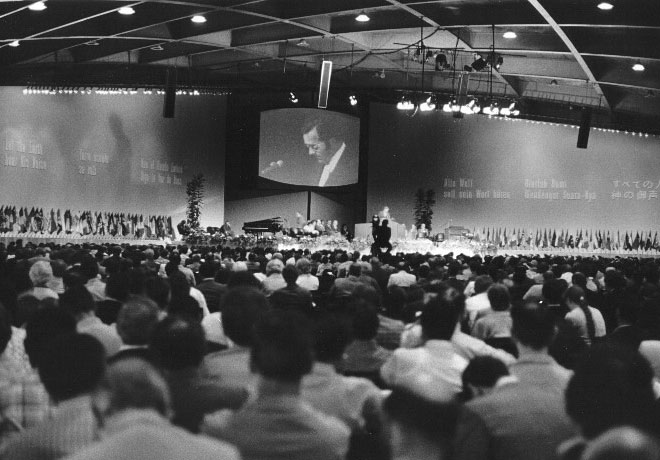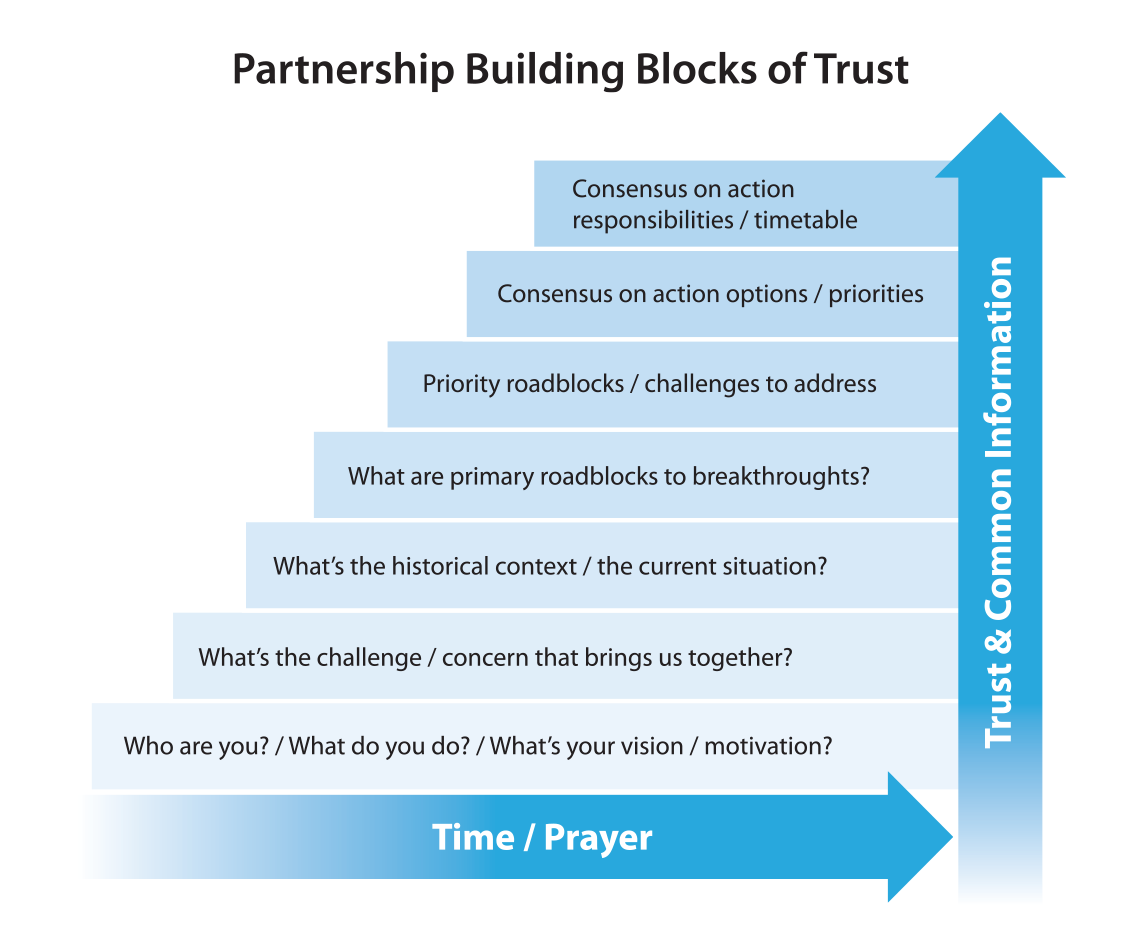Reality check
It had already been a long day. A dozen ministries were discussing their partnership to share Christ with young, aspiring Muslims in the region.
Some agencies were large and their contribution to the partnership reflected their size. There were smaller ministries whose contribution was, in comparison, modest. Yet all reflected the same level of commitment.
Some agencies were large and their contribution to the partnership reflected their size. There were smaller ministries whose contribution was, in comparison, modest. Yet all reflected the same level of commitment.
Some had a Pentecostal history, others a Reformed background. At least six nationalities were represented in the group. There were Western, international agencies. Others were national agencies with local leaders.
They had been working together for nearly a year and were seeing encouraging responses from ordinary Muslims as well as Islamic leaders. It seemed God was blessing this collaborative effort. The challenge? Each partner ministry had their own constituencies that called for reports—direct administrative leaders, those who prayed for them, and those who financially supported their work.
So, how to share credit? Security was an issue. What was said to whom about what was critical? With such diversity in the investments, what was fair? What was a reasonable way to deal with credit for this success?
There were conversations and prayer, then more conversations and prayer. In the end they concluded that every ministry could fully report the successes to their constituencies. They simply had to state that these outcomes were being realized as their ministry worked in partnership with others. Due to security concerns they could not name the other ministries. But they needed to acknowledge they were part of a collaborative effort.
Lausanne’s commitment
Since its birth in 1974 one of the distinguishing qualities of the Lausanne Movement has been its focus on linking God’s people together. Long before the awareness of the powerful role of the Global South in global Christianity, Lausanne encouraged kingdom collaboration. The First International Congress on World Evangelization in 1974 brought 2,300 leaders from 150 countries together to meet, talk, pray, and encourage partnership for world evangelization.

Trust: The essential in sharing credit
A variety of issues stand in the way of sharing credit. It may be ego, tradition, theology, money, personality, cultural style, or assumptions based on ignorance or bias. Let’s consider trust.
When thinking of trust in your partnerships, consider Jesus’ observations:
- Mark 9:39-41—Was it jealousy or a sense of desired exclusivity reflected in the disciples’ objection about others doing good in Jesus’ name? Remember Jesus’ response, ‘Whosoever is not against us is for us.’
- Mark 10:35-45—The disciples themselves were seeking a privileged position. Jesus concludes that ‘even the Son of Man came not to be ministered to but to minister and give his life a ransom for many.’
- John 4:35-38—Jesus makes clear that evangelism is a process in which different people play different roles. He emphasizes that they should celebrate each other and the outcomes of their joint effort. And the Apostle Paul makes the same point in the Apollos/Paul controversy in 1 Corinthians 1.
- Genesis 2-3—Satan’s essential message was, ‘You can’t trust God.’ In Adam and Eve’s decision, trust was broken and as a result, relationships were destroyed, and we continue to suffer the consequences of the loss of trust.
Simple but vital essentials
Here are three questions that you can always ask to build trust. Remember, our promises are only as good as our performance.
- Can you do it? In some cultures, it is hard to say ‘no’. Do we truly mean what we say?
- Will you do it? Nothing is so disheartening than knowing an individual or a ministry had the capacity to fulfill on the promise but failed to do so.
- Will you keep on doing it? Recall Jesus’ continued emphasis on faithfulness rather than success. If the promise made calls for it, will you keep showing up and performing?

Transparent relationships essential to trust and sharing credit
Trusting relationships believe the other person has our best interests at heart. The critical thing is to realize that transparency, honesty, and our relationship with others are at the heart of our relationship with God. We cannot have broken relationships on earth and expect to have an open, working relationship with God.
Consider Jesus’ teaching in:
- Matthew 5:23-24[1]—‘So if you are about to offer your gift to God at the altar and there you remember that your brother has something against you, leave your gift there in front of the altar, go at once and make peace with your brother, and then come back and offer your gift to God.’
- 1 John 4:20—‘If we say we love God, but hate others, we are liars. For we cannot love God, whom we have not seen, if we do not love others, whom we have seen.’
No one is perfect. We all have had bad moments, broken relationships, and a need to ask for forgiveness.
Practical steps to sharing credit
Remember, if an objective is so large that a partnership or network is needed, it means the objective, by nature, is complex. That calls for time and step-by-step thinking, planning, and implementation.
The chart below outlines the essentials and how this might work out when your partnership or network meets. Remember, each step builds on the previous one. It is the cumulative process that brings clarity and builds trust.

Complex challenges take time
A frequent downfall which leads to breakdown in hopes, relationships, and any chance of sharing credit is trying to do too much too quickly.
Particularly Western agency leaders frequently want to ‘hold the meeting and get on with the plan’. This often means that all issues and details are expected to be settled in a few hours. But multi-ministry collaboration, by definition, is not simple.
Effective facilitation is vital. In some cultures, it is acceptable for individuals who are not the leader of an organization to serve as facilitator. They may have the gifts, skills, and are credible—known to have everyone’s best interests at heart. In other cultures, with a more hierarchical tradition, a senior leader may need to facilitate.
I have frequently seen that the process suggested in the chart above takes at least two or more days. Efficiency and effectiveness are not the same! Trying to take shortcuts in the beginning is a recipe for disappointment if not disaster; it likely eliminates any reasonable basis for sharing credit! A longer, two-day approach provides wonderful opportunities to informally eat, share, and even sleep in proximity. It is low cost and goes a long way toward trust-building.

As is usually the case, a partnership and networking involve larger and smaller ministries. Too often larger ministries effectively dominate proceedings, though this may not be intentional. Unless large and small ministries have equal opportunities to share their stories as suggested in the first step in the chart above, there is no hope of a ‘level playing field’ and an atmosphere which encourages sharing credit.
Keep in mind these admonitions:
- Acts 20:35—‘I have shown you in all things that by working hard in this way we must help the weak, remembering the words that the Lord Jesus himself said, there is more happiness in giving than in receiving.’
- Romans 12:15-16—‘Be happy with those who are happy, weep with those who weep. Have the same concern for everyone. Do not be proud, but accept humble duties. Do not think of yourselves as wise.’
- Philippians 2:3—‘Don’t do anything from selfish ambition or from a cheap desire to boast, but be humble toward one another, always considering others better than yourselves.’
Finally, here are the essential elements that build trust and establish the ground for effectively sharing credit.
 Purpose/Vision
Purpose/Vision
Does the purpose meet these criteria?
- Something that clearly God wants done, not a private agenda.
- Something that is too complex to be done by a single agency.
- Will bring added value to the work/ministry of each partner.
- Can be evaluated/measured: specific, limited, and achievable objectives on a reasonable timeline.
 Person
Person
Do the leaders/facilitators display these qualities?
- Absolute integrity; say what they mean and mean what they say.
- Active listeners; ask good questions and are genuinely interested in the concerns of each individual or ministry.
- Know how to maintain confidentiality when appropriate.
- Demonstrate a commitment to each partner’s best interest, not just the big vision.
 Process
Process
Does the partnership or network reflect these qualities?
- Transparency—everyone knows how decisions are made and priorities set.
- Full disclosure —agendas are circulated, along with any associated material, well before meetings and input are requested. Help get participants ‘on the same page’ as soon as possible.
- Clear ‘on-boarding’ procedure—new members/participants understand what the partnership does and how they can play an active role.
- High engagement—demonstrate the value of and commitment to the vision by staff attending that can represent the agency in decision-making.
- Full participation—partnership or network meetings are characterized by all participants engaging in the conversation and actively taking part in evaluation, decision-making, and celebration.
Final thoughts
In the COVID-19 pandemic we have seen intense levels of collaboration going on—among many levels that, previously, had not been seen as routine. But, intensity of circumstances raises awareness of how relationships and systems relate. It has been heart-warming to see the extent to which various elements of the response chain have affirmed each other—sharing credit. The more dire the enemy the more likely we are to appreciate colleagues who are fighting alongside us, even though their role may be quite different.
Ability to share credit is a good indicator of the health of any partnership or network.
Then, ability to share credit is a good indicator of the health of any partnership or network. If our effort is healthy, it is most likely to be effective and realize the goals we have set. Ability to share credit suggests we respect our colleagues and their contribution to the collaborative effort. It sets the stage for celebration as the group achieves objectives we have jointly set and realized. It means that we, individually, as well as collectively in the collaborative effort have a fresh sense of freedom. And, as always, with freedom comes joy. Both are qualities that should and can mark our partnership or network as we affirm sharing credit with those working alongside us in the collective effort.[2]
Endnotes
- Scripture quotations from the Good News translation
- Editor’s note: See article entitled, ‘Is Our Collaboration for the Kingdom Effective?’ by Phill Butler in the January 2017 issue of Lausanne Global Analysis, https://lausanne.org/content/lga/2017-01/is-our-collaboration-for-the-kingdom-effective

